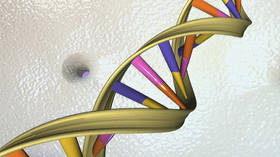DNA ‘echoes’ of ancient viruses could help to kill cancer, new research finds

Fragments of ancient viruses that infected our ancestors over millions of years, and remain dormant in our DNA, offer a tantalizing opportunity to find and kill cancers effectively, according to new research.
Some 8 percent of the human genome comprises such retroviral DNA, researchers from the Crick Group say, and, while it typically lies dormant, it can be reactivated when a cell becomes cancerous.
Also on rt.com Crack team of scientists discovers secret weapon to neutralize HIV… by accidentThe scientists studied viral DNA for ways to draw on the reactivation phenomenon when tackling cancer, chiefly by honing in on ways to train the immune system to spot and target cancer cells. The reactivation can create ‘products’ which are visible to the immune system, and which, the researchers believe, can be exploited to fight cancer early.
The team looked at patient samples from 31 different cancer types to create an enormous catalogue of the elements produced by endogenous retroviruses, narrowing the field down to “nine unique peptides” visible to the immune system.
“We hope this approach could form the basis of future cancer therapies, if we can vaccinate the immune system to recognise and attack cancer cells presenting these peptides,” Dr George Kassiotis, who led the study, explained.
The researchers have published their findings in the journal Genome Research.
Also on rt.com Putting on a brave face: ‘Denise’ offers us our first look at the long-lost Denisovan race (PHOTOS)Think your friends would be interested? Share this story!














